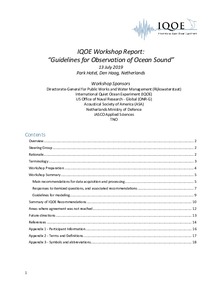| dc.contributor.editor | Ainslie, Michael | |
| dc.contributor.editor | de Jong, Christ | |
| dc.contributor.editor | Miksis-Olds, Jennifer | |
| dc.date.accessioned | 2020-04-22T21:24:18Z | |
| dc.date.available | 2020-04-22T21:24:18Z | |
| dc.date.issued | 2019 | |
| dc.identifier.citation | Ainslie, M.; de Jong, C. and Miksis-Olds, J. (eds) (2019) IQOE Workshop Report: Guidelines for Observation of Ocean Sound, 13 July 2019, Park Hotel, Den Haag, Netherlands, Internatonal Quiet Ocean Experiment/SCOR/POGO, 18pp. DOI: http://dx.doi.org/10.25607/OBP-802 | en_US |
| dc.identifier.uri | http://hdl.handle.net/11329/1294 | |
| dc.identifier.uri | http://dx.doi.org/10.25607/OBP-802 | |
| dc.description.abstract | A one-day workshop was convened to develop International Quiet Ocean Experiment (IQOE) program guidelines for measuring, processing, and reporting of ocean sound levels. Fifteen international experts came together from eight countries to discuss current practices for measuring, processing, and reporting ocean sound levels from existing long-term monitoring projects and to recommend key consensus parameters for ocean sound level measurements designed to facilitate cross-project comparisons. The workshop product is a meeting report that includes recommendations directed to ocean sound research programs, sponsoring international organizations, and/or their science advisory groups to support the development and implementation of ocean sound processing reporting guidelines needed to make meaningful soundscape comparisons across time, space, and monitoring programs. The ocean community is challenged on how to best monitor and compare soundscapes over time and space to appropriately interpret change and impact when there are no standards or accepted guidelines on how to collect, process, and report ocean sound levels. Many ocean sound observation projects world-wide have started or are being planned (Table 1); harmonization and standardization of approaches will facilitate inter-comparison of the results. A lack of data processing, modeling and reporting standards can lead to the misinterpretation of analyses, creation of policy that may be either too conservative or liberal, and create obstacles for collaboration across past, current, and future monitoring studies. This is a time-critical topic, as ocean sound has recently been accepted as an Essential Ocean Variable (EOV) by the Global Ocean Observing System (GOOS) (Miksis-Olds et al., 2018), and a large influx of ocean sound data are expected in the near future as new acoustic sensors are integrated into GOOS. Multiple national and international entities have recognized the significance in addressing this need by convening cross-sector workshops of ocean stakeholders over the past five years to develop protocols and guidelines towards standardizing ocean sound analysis and reporting (IWC (2014); COL (2018)). These workshops resulted in the identification of consensus items and recommendations to enable meaningful soundscape comparisons, but lack of funding and leadership has led to systemic inaction in moving from recommendation to implementation. This IQOE Standards workshop was designed to evolve from recommendations to the development of guidelines for measuring, processing, modeling and reporting of ocean sound levels with application to characterization of soundscapes, ambient sound and ambient noise. | en_US |
| dc.language.iso | en | en_US |
| dc.publisher | International Quiet Ocean Experiment (IQOE) | en_US |
| dc.rights | CC0 1.0 Universal | * |
| dc.rights.uri | http://creativecommons.org/publicdomain/zero/1.0/ | * |
| dc.subject.other | IQOE | en_US |
| dc.subject.other | Ambient noise | en_US |
| dc.subject.other | Man-induced effects | en_US |
| dc.subject.other | Standards | en_US |
| dc.subject.other | Soundscape | en_US |
| dc.subject.other | Reporting | en_US |
| dc.title | IQOE Workshop Report: Guidelines for Observation of Ocean Sound, 13 July 2019, Park Hotel, Den Haag, Netherlands. | en_US |
| dc.type | Report | en_US |
| dc.description.status | Published | en_US |
| dc.format.pages | 18pp | en_US |
| dc.contributor.corpauthor | International Quiet Ocean Experiment | en_US |
| dc.description.refereed | Refereed | en_US |
| dc.subject.parameterDiscipline | Parameter Discipline::Physical oceanography | en_US |
| dc.subject.parameterDiscipline | Parameter Discipline::Physical oceanography::Acoustics | en_US |
| dc.subject.instrumentType | Instrument Type Vocabulary::hydrophones | en_US |
| dc.subject.dmProcesses | Data Management Practices::Data analysis | en_US |
| dc.description.currentstatus | Current | en_US |
| dc.description.sdg | 14.A | en_US |
| dc.description.eov | Ocean sound | en_US |
| dc.description.bptype | Best Practice | en_US |
| obps.contact.contactemail | ed.urban@scor-int.org | |
| obps.contact.contactorcid | orcid.org/0000-0002-6177-5585 | |
| obps.resourceurl.publisher | https://scor-int.org/IQOE/IQOE_2019_Standards_Workshop_Report.pdf | en_US |
 Repository of community practices in Ocean Research, Applications and Data/Information Management
Repository of community practices in Ocean Research, Applications and Data/Information Management

